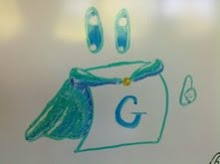I've mentioned before that I think Tsuro is a very elegant game. If I get a group of thoughtful people together to play, they will often notice some of the great properties that aren't immediately obvious. No cycles (for player tracks) and no overlapping paths make sense after some consideration, but it is still often asked as a question.
A quick synopsis of the game is that pieces move along paths printed on tiles. On your turn, you play a new tile on an untiled place on the board to move your piece further along. These tiles each have a different matching of paths connecting two sides. That place of a tile could move other pieces, also. A player loses when they either collide with another piece or follow a path off the board.
Aside from the parts mentioned up top, there are other cool aspects of Tsuro. One of these is the fact that it looks a lot like Geography.
Geography? How could that be? Geography is impartial! Tsuro is very partisan: each player has their own hand of tiles and their own piece.
Well, first of all, in order to make it more "combinatorial gamey" we have to consider removing the hands anyways to eliminate hidden information. (Perhaps instead there is just a communal pile everyone selects from.)
Now, what if instead of having two pieces, both players shared the same piece. Now you have to make sure you don't lead the piece off the board on your turn. This now looks a lot like geography, where players traverse a directed graph and must avoid crashing into an already-visited vertex.
There are plenty games that enforce a sort of locality---you have to play near the last play. Tsuro has a cool property where each player has their own sense of locality. They play not from the last play, but from their last play (unless they get moved).
What if the same were true in Geography? What if each player had their own piece moving through the directed graph, but you lose if you visit a vertex previously visited by either player? How difficult is it to play this version well?
In a very unrelated note, Molly points out this podcast, which contains a cool mention (near the end) of a board game enthusiast who uses analogical modelling to choose whether or not to buy a new board game. Ha!
Jokes from the Audience
5 days ago



No comments:
Post a Comment